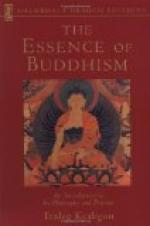Because the dove fears the
hawk,
With fluttering pennons she
comes to seek my protection.
Though she cannot speak with
her mouth,
Yet through fear her eyes
are moist.
Now, therefore, I will extend
(to this poor creature)
My own protection and defense.
—Ta-chwang-yan-king-lun.
How indifferent he was to his own welfare!...
How intolerant of the suffering of others!—Jatakamala. In every condition, high or low, we find folly and ignorance (and men), carelessly following the dictates of ... passion.—Fo-sho-hing-tsan-king.
Neither is it right to judge men’s character by outward appearances.—Ta-chwang-yan-king-lun.
The body may wear the ascetic’s garb, the heart be immersed in worldly thoughts: ... the body may wear a worldly guise, the heart mount high to things celestial.—Fo-sho-hing-tsan-king.
Full of truth and compassion and mercy and long-suffering.—Jataka.
Uprightness is his delight.—Tevijja-sutta.
Making ... virtue always his first aim.—Fa-kheu-pi-u.
An example for all the earth.—Fo-sho-hing-tsan-king.
What he hears he repeats not there, to raise a quarrel against the people here.—Tevijja-sutta.
He injures none by his conversation.—Samanna-phala-sutta.
Walk in the path of duty, do good to your brethren, and work no evil towards them.—Avadana Sataka.
Aiming to curb the tongue, ... aiming to benefit the
world.—Fo-sho-hing-tsan-king.
Intent upon benefiting your fellow-creatures.—Katha Sarit Sagara.
Health is the greatest of gifts, contentment the best of riches.—Dhammapada.
If thou be born in the poor man’s hovel, yet have wisdom, then wilt thou be like the lotus-flower growing out of the mire.—Jitsu-go-kiyo.
He that is rich but is not contented endures the pain of poverty.—Fo-sho-hing-tsan-king.
The words of Buddha, even when stern, yet ... as full of pity as the words of a father to his children.—Questions of King Milinda.
Overcoming all enemies by the force (of his love).—Fo-sho-hing-tsan-king.
How great his pity and his love toward those who opposed his claims, neither rejoicing in their defeat, nor yet exulting in his own success!—Fo-sho-hing-tsan-king.
The Buddha has mercy even on the meanest thing.—Cullavagga.
He that ... would wait upon me,[3] let him wait on the sick.—Mahavagga.
[Footnote 3: Buddha.]
The Buddha, O king, magnifies not the offering of gifts to himself, but rather to whosoever ... is deserving.—Questions of King Milinda.
If you desire to honor Buddha, follow the example of his patience and long-suffering.—Fo-sho-hing-tsan-king.
Radiant with heavenly pity,
lost in care
For those he knew not, save
as fellow-lives.
—Sir Edwin Arnold.




